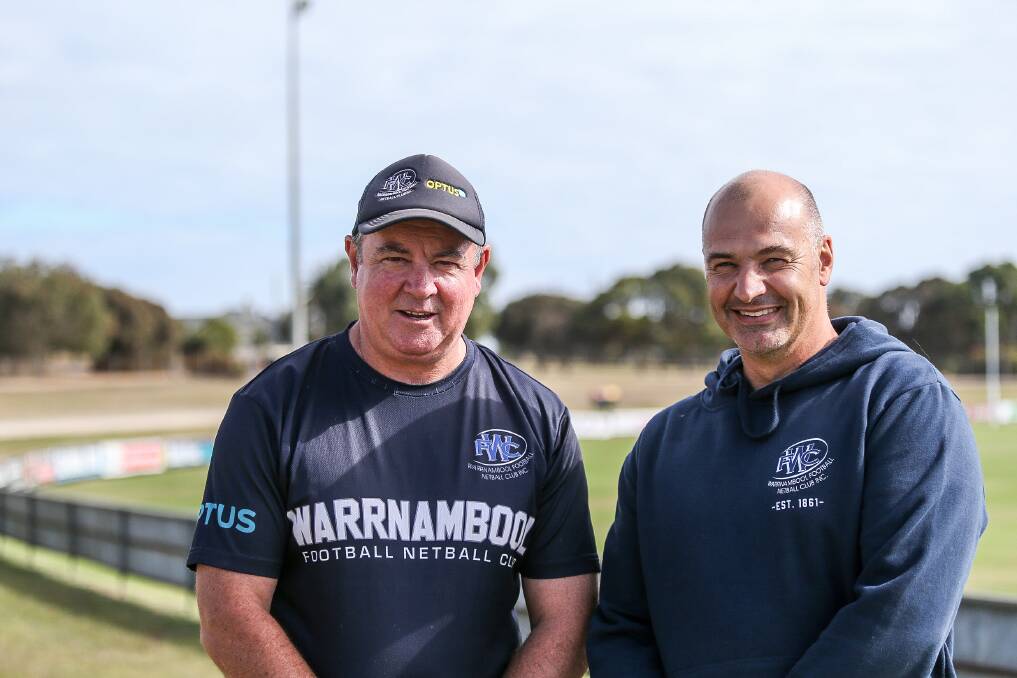
South-west football and netball clubs are working to change perceived drinking cultures within their communities, as new data reveals one-in-10 sports club incidents involve booze.
Subscribe now for unlimited access.
or signup to continue reading
Figures from VicHealth's Last Drinks project show on-field clashes are not the only sources of sporting injury, with 10 per cent of club incidents ending in an emergency visit involving alcohol products.
Football clubs topped the list, comprising 45 per cent of all alcohol-related injuries at a sports club, followed by netball, cricket and lawn bowls, according to data collected at Warrnambool Base Hospital.
Researchers also noted incidents stemming from local soccer and volleyball clubs.
The figures, collected by Deakin University researchers and emergency department staff to shed light on the community harm caused by alcohol products, show 84 per cent of those injured at a sports club while drinking are male with an average age of 36 years.
The findings are not lost on the management team at Warrnambool Football and Netball Club, where a cultural shake-up over the past two years has seen more young families signing up to the 150-year-old community stalwart.
Backed by the Good Sports program and the AFL's Leading Teams initiative, the club's board and committee developed a new vision based on community, family and respect.
Junior development coordinator Ken Radley said low-risk use of alcohol products was a major part of that vision.
"Having a licensed social club and gaming facility here, we're more than aware of our obligations to the community and our juniors, but that also flows onto our senior players and how they are regarded by kids around the club," Mr Radley said.
With a long history of on-field success, the club decided to place equal weight on the off-field development of players at every level, bringing in ambassadors and other experts to coach on social and emotional development.
Warrnambool sons and AFL heroes including Melbourne midfielder Jordon Lewis, ex-Cat Simon Hogan and former Swans defender Daniel O'Keefe headline player information sessions covering respectful relationships, mental health, choosing positive social groups and reduced alcohol consumption.
"Players from junior to senior hear about what it takes to play at elite level and how off-field behaviour and characteristics are taken into consideration in draft picks," Mr Radley said.
"We believe every player at our club should leave a better person, and while that might seem a long way from a typical football club, we believe that if we get the off-field stuff right that the on-field character will develop as well."
Football and netball operations manager Wally Steere said in addition to its players, the club was keen to ensure visitors felt safe and comfortable.
"We want all people - young, middle aged or older - who come into the social areas of our club to know they won't be confronted by a rowdy group of men or women drinking excessively and behaving badly," Mr Steere said.
"The club has been a major part of the community for over 150 years and I think we have an obligation to our members and to the broader Warrnambool community to set a standard and a culture that is acceptable about low-risk use of alcohol as well as general standards of conduct."
And their efforts are paying off, with 400 players across all ages of the football and netball competition signed up for the 2019 season.
"The buy-in by families has been extremely pleasing to the point where we can barely take any new players on," Mr Radley said.
"Our families are staying and our seniors are staying and I think that really says something about what the club is doing right."
Across the greater Warrnambool area 36 sports clubs - from AFL, netball and cricket to fishing, gymnastics and hockey - are signed up to Good Sports, an initiative of the Alcohol and Drug Foundation aimed at building healthier teams and clubs.
Of that number 27 clubs have achieved Level 3 certification, which involves having an alcohol management policy in place.
Mr Steere encouraged other sports clubs to get behind the initiative and build a program to suit their member needs.
"Back in the 70s and 80s it seemed like if you went to the footy it was your divine right to make sure you came home legless," Mr Steere said.
"But society is changing and if we can help lead the way then we can feel comfortable about that."
Last Drinks Warrnambool is part of the Driving Change trial running in emergency departments across Victoria, NSW and the ACT until 2021.
As part of the project, which builds on a pilot study run in Warrnambool in 2014, hospitals gather information on alcohol-related presentations, including time and location of drinking, injuries and weapons used.
The data is used to create practical ways of reducing harm from alcohol products within the community.
- Anyone wanting help to cut down or quit can call DirectLine confidential alcohol and drug service on 1800 888 236, Turning Point live online counselling at www.counsellingonline.org.au or contact their GP.















